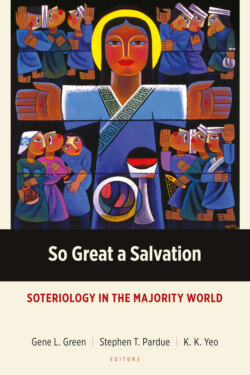Читать книгу So Great a Salvation - Группа авторов - Страница 24
На сайте Литреса книга снята с продажи.
Internal and External Critique
ОглавлениеFor all their variety, Western accounts of salvation strive for some comprehensiveness by encompassing past, present, and future. Regarding the past, forgiveness of sin initiates new life; regarding the present, transforming grace works that new identity into patterns of living; regarding the future, the fullness of eternal life involves bodily resurrection and complete personal renewal in the joyful immediacy of God’s presence. These soteriologies encompass the full history of human lives in this way, but particular persons are their focus. What therefore do they neglect?
The answer of some classically liberal and nearly all liberationist theologies, whether in the West or abroad—as well as other indigenous theologies from the Majority World—involves the gospel’s sociopolitical and cosmic dimensions.[28] To mention a very concrete example, conservative Western soteriologies speak of “justification” and “righteousness” rather than “justice.” What a difference such connotations make![29] Accordingly, traditional accounts narrowly construe salvation’s future, overemphasizing personal destiny in disembodied, individualistic, and unearthly ways. Additionally, they ignore their own contextual character, applying adjectives only to other soteriologies—as if other indigenous accounts are syncretistic or at least situated whereas the West’s are just fundamentally scriptural.
Traditional reactions to such critiques can be grudging or dismissive. Although evangelical Protestant theologians have begun to address the gospel’s corollary matters of systemic evil and structural sin, those efforts have been sufficiently late and modest that the issues remain barely acknowledged at the popular level.[30] Corresponding soteriologies remain personally focused. Similarly, though professional or episcopal Orthodox theologies may have a slightly more cosmic focus, national and popular features of church life complicate any claim regarding soteriological holism. Catholic soteriology, meanwhile, made liberation theology possible but also necessary.
The Catholic response to liberation theology has been complex. On occasion the Vatican has disciplined figures within that movement officially, while more often resisting aspects of its perspective. Yet the Vatican clearly adopted much liberationist critique of late modern global capitalism along with increased emphasis upon God’s embrace of the poor, while most liberationist figures remain in good churchly standing. Much liberation theology appealed to the Bible for its broader account of sin and salvation, with the exodus as a starting point plus the prophets and Gospels as additional support.
Conservative critique addressed liberation theology’s biblical priorities and proportions, often regarding what is not said more than what is. Official Vatican critique addressed Marxist theory and revolutionary practice as much as anything else. Still other critique came from seemingly more sympathetic quarters. Native Americans, among other indigenous or First Nations groups, faulted the exodus paradigm for failing to address its corollary, the conquest. This worry is not just conceptual but historical: the conquest of Canaan became a paradigm for European colonizers in America.[31] More broadly, postcolonial theorists critique liberation theologies for redeeming aspects of Scripture as if they were authoritative; the very notion of biblical authority is allegedly oppressive, if not most or all biblical content. By their own acknowledgment, though, such postcolonial thinkers frequently are not pursuing Christian theology but another enterprise that, despite its importance, must be seen in external rather than internal terms.[32]
Liberationist critique of traditional Western soteriologies originated among Majority World oppressed peoples, at priestly and popular levels. Soon liberationist models arose among marginalized groups within the West, as black theologies illustrate. Feminist theologies, with their womanist (emerging from black women) and mujerista (emerging from Latin American women) descendants, further illustrate the complexity of marginalization and oppression: they appropriate earlier liberationist elements while pursuing further liberation from aspects of those very movements. Various liberationist concerns now vie for influence in mainline Protestant and progressive Catholic circles. The complexity is illustrated in the interface with interreligious dialogue: should contextual theology in South Asia appropriate mainstream Hindu notions for the sake of dialogue, or side with Dalit persons for the sake of liberation?
Naming such complexities must not distract us from the central critique at issue. Traditionalist Western soteriologies apparently focus so much on the gospel’s personal benefits, in particular concerning an individual’s eternal destiny, that they neglect its communal and cosmic, perhaps even bodily, dimensions. Traditionalists find this personal focus emerging naturally from biblical texts. Hence we face this question: Are there lines of biblical teaching that widen soteriology’s focus, while fitting alongside the personal aspects in the rest of the picture? Or do those other lines of biblical teaching generate a competing soteriological picture that minimizes or even lacks personal salvation?
